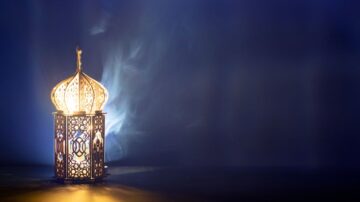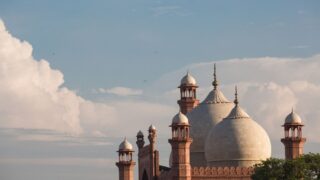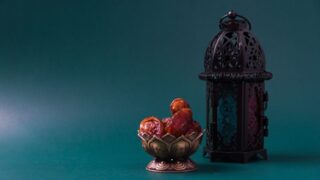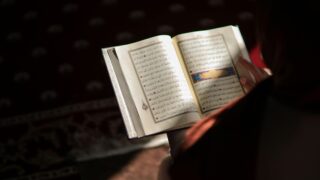Every Ramadan we make plans to improve ourselves as Muslims, but those plans do not always come to fruition later because the surge of faith that we have now is severely lacking outside this blessed month.
Part of the reason is because the devils are locked up during this month, so to repel the devils we need knowledge. Ramadan specifically is a period of worship. It is a time when families come together, make du`aa ’together, break their fast together, and eat suhoor together. Families pray together more, and they read Qur’an. These are all acts that bring family members closer to each other, and in turn they also draw closer to Allah the Almighty.
These acts cannot be sustained until a person tastes the sweetness of faith, and that will not come until they are grounded in knowledge. This is how our belief increases, and we draw closer to Almighty Allah in this way, because when a person worships with knowledge, he worships with humbleness and firm belief.
We need activities to keep our faith on the increase. Specifically, we need to seek knowledge, especially in the west where we are faced with attacks from every direction.
Just wishing is not enough. If there is a thirst for knowledge and learning the religion, then why are we not taking advantage of the opportunity? How many people want to memorize Quran, but how many of those same people are willing to give a few hours of their time every week to review and memorize with a teacher?
It is not that these questions are unimportant, but they lack insight. We need to ask about the ruling on seeking knowledge of the religion which is obligatory upon every Muslim. Knowledge is obligatory on everyone no matter what field they are involved in; for example, you must learn the fiqh of business, and riba, before going into business or finance so that you do not fall into what is prohibited. If you have wealth, you must learn the fiqh of zakah . Every Muslim must know the rulings of wudu’ and prayer. A man must know, for example, what is obligatory upon him in regards to taking care of his wife and children
`Ali ibn Abi Talib (may Allah be pleased with him) said, “Whoever has six qualities will leave no path to Paradise and be away from the Fire, but [he] will have taken it. They are,
1. He knows Allah and obeys Him
2. He knows the devil and disobeys him
3. He knows the truth and follows it
4. He knows falsehood and stays away from it
5. He knows life and avoids it
6. He knows the Hereafter and seeks it.”
The Prophet (peace and blessings be upon him) was commanded in the Qura’n to seek knowledge. We are only asked to increase our knowledge. He (peace and blessings be upon him) also used to supplicate Allah the Almighty to grant him beneficial knowledge, and he would seek refuge from knowledge that did not benefit.
Allah the Almighty says:
(But those among them who are well-grounded in knowledge, and the believers, believe in what has been sent down to you (Muhammad SAW) and what was sent down before you, and those who perform As-Salah (Iqamat-as-Salat), and give Zakah and believe in Allah and in the Last Day, it is they to whom We shall give a great reward.) (An-Nisaa’ 4: 162)
Knowledge is the Key to Establishing Endless Acts of Charity
Everyone wants to leave a legacy. This is a universal human value that we all share. Even the disbelievers share this goal with us. Almost every person has a goal of making some contribution to their family or society and being remembered for it. However, only the believer will see the benefits of this after death.
The Prophet (peace and blessings be upon him) said, “When a servant (of Allah) dies, his (good) deeds will cease, except for three (kinds of deeds): A charity with continuous effect, a kind of knowledge from which people draw benefit, and a good son who prays to Allah for him.” (Al-Bukhari and Muslim)
If we do not do this, we are like the rest of humanity and will be at a loss. This is the default situation of man, the base case scenario; he is at a loss.
(By Time, Verily Man is at a loss. Except those who believe and do righteous good deeds, and recommended one another to the truth, and recommended one another to patience.) (Al-`Asr 103: 1-3)
The Prophet (peace and blessings be upon him) also said, “Indeed, this world, with all it contains, is cursed, except for the remembrance of Allah and what follows it from deeds that are pleasing to Allah, scholars (of religion) and seekers of knowledge.” (Tirmidhi)
The problem is that we become content with what we have, and if we look at the example of our righteous predecessors, none of them were ever content. We must take advantage and change our lives right now. There is no time to make intentions and resolve to do better. Such thinking does not exist in the workplace so why do we expect it to exist with Allah the Almighty? We must take concrete action to better ourselves and our communities.
It is only Satan who misleads us and encourages us to be lazy, and he will keep making us procrastinate so much so that the only time we gain any real knowledge is after our death.
`Abdullah ibn ‘Awn said, “Those who were before us would leave for this life what remained with them after taking care of their Hereafter. You, on the other hand, leave for your Hereafter what remains after taking care of your life.”
We have a disease in our hearts when we say “faith is in the heart” or “faith is only on the inside.” This is nothing more than a feeble excuse and a trick! We all quote the hadith “actions are by intentions” as proof for this, but it is actually proof against us. It says actions are by intention – the action comes first and then the intention of the action is judged. To merely make an intention without an action is of no benefit, especially when there is nothing preventing us from doing the action.
We cannot simply intend to establish Islamic institutions, or establish classes, seek knowledge, or teach our children about Islam. We must put it into action because when we put it into action, then we can leave a lasting legacy of that knowledge to those around us. It does not necessarily mean that you must produce some academic work, but it means to impact someone around you in a positive manner, such that, in sha’ Allah, you will benefit from your action after your death.
Tying it All Together – Example of Worshipping with Knowledge
Imam Ahmad recorded from `A’ishah (may Allah be pleased with her), that she said, “O Messenger of Allah! If I find Laylat Al-Qadr what should I say?” He replied, “Say: ‘Allahumma innaka ‘Affu, tuhibbul ‘afwa, fa’fu’annee’ (O Allah! Verily, You are the Oft-Pardoning, You love to pardon, so pardon me).” (Tirmidhi and An-Nasa’i)
It is recommended that we supplicate with this as we seek the blessed night that the Quran was revealed in. Have we pondered over its meanings?
Al-’Affu is one of the Majestic Names of Almighty Allah. Linguistically, it means to pardon. ‘Aafiyah is Allah’s defense of His servant from disease, tribulation, fears, doubts, and so on.
This name occurs in the Qu’ran five times, once with the Name al-Qadir, and the rest with Al-Ghaffur. Al-Ghaffur also means to wipe away a person’s sins. Combined with Al-`Affu it means that Almighty Allah overlooks and pardons a person’s sin, and then wipes it completely away.
Why would this name be coupled with Al-Qadir? Al-Qadir is the One who is powerful, able to do all things, the One with the right and power to punish His slaves for sinning. What does this have to do with neglecting one’s sins?
In our interpersonal relationships, sometimes we are compelled to forgive each other for things that have been done to us. It may be because of a favor someone has done for us, or pressure from someone. By combining Al-`Affu with Al-Qadir, Allah the Almighty is telling us that He has all power and every right to punish us for our sins; however, He (out of His Mercy) has chosen to forgive us and pardon us.
May Allah the Almighty let us all live to see Laylat Al-Qadr this year, and benefit from it, and be amongst His righteous and knowledgeable worshippers.
By Ibn Abee Omar

















